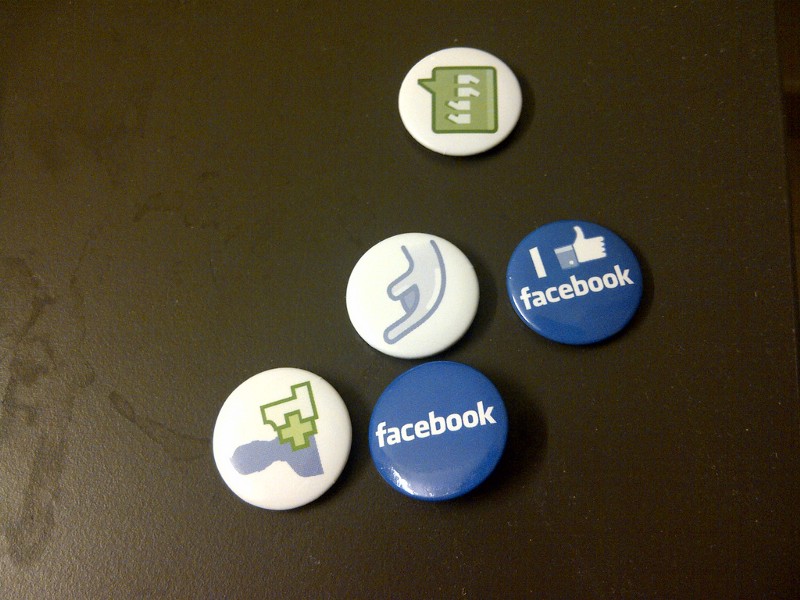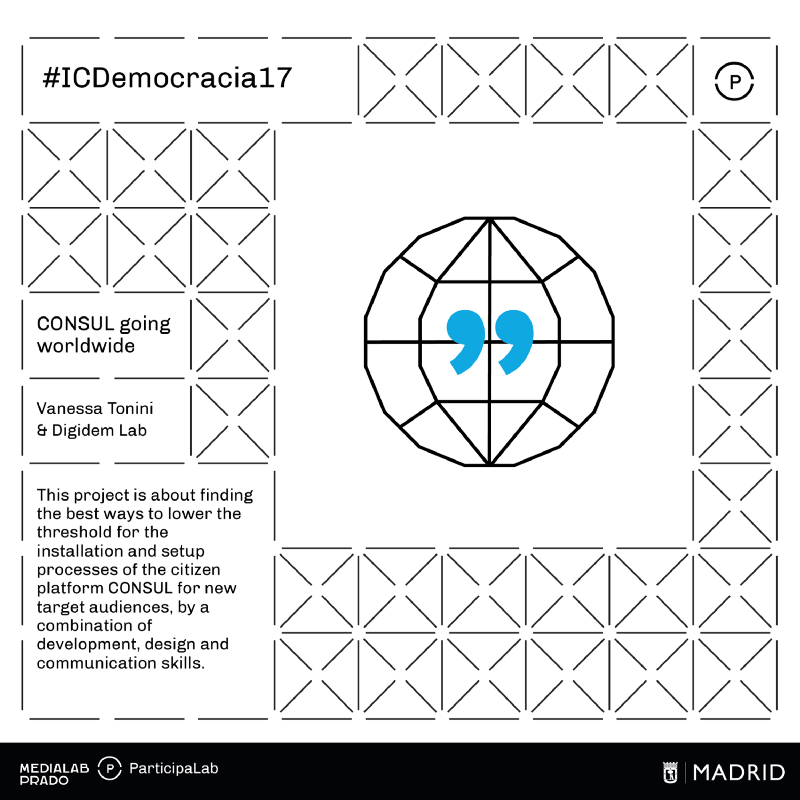I had the privilege to be able to spend a few days in Berlin with Free Software Foundation Europe, and spoke to Matthias Kirschner about free software and citizen participation:
SFP#17: Citizen participation through Free Software with Petter Joelson
There are 4 posts tagged Democracy (this is page 1 of 1).
I had the privilege to be able to spend a few days in Berlin with Free Software Foundation Europe, and spoke to Matthias Kirschner about free software and citizen participation:
SFP#17: Citizen participation through Free Software with Petter Joelson

Vad vi vetat sedan tidigare är att Facebook samlar in all vår användardata för att sälja riktade annonser. Det kan låta harmlöst, men har till exempel använts för att sälja annonspaket som riktar sig specifikt till psykiskt instabila tonåringar.
Det nya som kommit fram de senaste veckorna är hur den sammantagna datan från miljontals användare använts för att påverka politiska val och folkomröstningar, utan användarnas godkännande och eventuellt i strid mot lagen.
För att ge en kort sammanfattning, så samlade tvivelaktiga forskare och företag 2014 in data från 50 miljoner ovetande användare. Baserat på den informationen skapade de ett system för “psykologisk profilering”, till exempel genom kartläggning av användarnas sexuella läggning, barndoms-trauman eller etnicitet. Det systemet användes sedan för att, ofta med skrämselpropaganda, skapa riktad annonsering för Trumps valkampanj och Brexit i Storbritannien. Facebook har känt till att användardatan missbrukats, men i princip inte gjort något alls för att stoppa det.
Hur kan demokratiska föreningar, speciellt föreningar för unga personer, förhålla sig till det här? Vi vet att många föreningar är beroende av Facebook för att nå ut till nya och gamla medlemmar, för att opinionsbilda, ordna event, diskutera och organisera sig internt.
Hur skyddar vi våra medlemmars personliga data från att missbrukas av skrupellösa företag eller xenofoba politiska kampanjer?
Är det överhuvudtaget förenligt med demokratiska värderingar att använda Facebook?
I Digidem Lab arbetar vi med att hitta och rekommendera säkra digitala verktyg för organisering för föreningslivet. Säkerhet är alltid relativt, och behöver ofta vägas mot användarvänlighet, effektivitet och förmåga att nå ut till många. Även om vi föredrar kryptering, öppen källkod och decentraliserade tjänster är det inte alltid praktiskt möjligt att använda den typen av tjänster.
I nästa blogginlägg kommer vi att rekommendera några säkrare digitala verktyg för föreningar.
The citizen platform Consul is used by Madrid and over thirty other cities in Spain, as well as several cities in Latin America. In the last few months it has also been used by the social housing company of Paris for participatory budgeting and the British People’s Momentum for their annual meeting. This makes it one of the most interesting and well used open source projects for deliberative democracy right now.
Many of the organisations and social movements that we in Digidem Lab are in contact with are impressed by the possibilities of Consul. But it is also hard to demo the tool for them, and show them what their next step for implementing it would be.
Although a very useful tool with a wide range of use cases, the installation and setup process requires a lot from its administrators, and is something we believe is holding it back from being more widely used.

With the new target audiences for Consul (cities abroad, NGO:s, different kind of participatory budgets), we need to look at the user journeys for adapting the tool for the different users and see how to best meet their needs and expectations.
This project is about finding the best ways to lower the threshold for the installation and setup process for these new target audiences. With an interdisciplinary team of marketers, developers and designers, we would be able to tackle many of the obstacles to wider implementation of Consul and provide a clear step by step process for any organisation interested in implementing and adapting it.
Any self hosted platform will of course have the problem of needing people with technical expertise. But some open source platforms, like for example Nextcloud, has shown an ability to meet their users half way by providing a range of options for installations, demo versions and documentation.
We will work in two phases, by first identifying new target audiences, their needs and pain points; then work iteratively on the setup process and documentation.
In the first phase we will get to know the users by defining target audiences, researching user experiences, defining personas and drawing user journeys.
Defining new target audiences: Which are the new groups using Consul, and how do we pinpoint and define these new users?
Researching user experiences: Interviewing for example Open Source Politics from France and Peoples Momentum from the UK about their experiences from using Consul in new contexts.
Personas and user journeys: Defining detailed profiles for our new personas. Creating user journeys for how the personas ideally would come to adopt Consul. Identifying pain points and obstacles where improvements in the documentation and installation process can be made.
In the next stage, we work on improvements in iterations looking at for example automated installation options; a clearly designed installation guide; pre-configured installation profiles or demo versions based on the known user cases like citizen platforms, annual meetings, participatory budgeting.
Automated installation: Help the Consul development team with automated installation scripts for Ansible or Heroku. There are some progress in making Docker images that we could develop further.
Installation guide: There is a new drafted text from the Consul team. We could design and set up a manual in for example Read the docs or Hexo and work on the texts. Another option to explore is to make instruction videos for the different user cases.
Installation profiles and demo versions: The Consul team is working on a preconfigured setup file that we could extend to cover more cases that would be useful for demo versions.
We are collaborating with the Consul development team to contribute to their work and base this development on their future needs. They are already making progress in these three areas, that we could feed into and develop further during the lab.
The overall theme is to make the installation and setup process easier and more accessible, to make it go worldwide! While these are general ideas about how to do it, the exact ways will depend on the identification of personas and user journeys, our contact with the Consul team, and the input and different skills that the working team contribute with during the lab.
This is a description my project for as a part of the Collective Intelligence for Democracy workshop in November 2016 for MediaLab Prado Madrid.
In Sweden, more young people use Facebook every day than who voted in the last general election. This is an international trend, and most certainly does not come down to lack of interest in politics from young people, but from outdated and excluding tools and processes for democratic participation.
Digital tools open up completely new possibilities for instantaneous participation, discussions and decision making, without relying on geographical proximity. If traditional political instances and organisations do not adapt to new ways of working and thinking, they will keep losing trust and members. If they take advantage of the new possibilities of participation they will have enormous potential.
In the rest of Europe, we look up to you in Spain. You have found ways of implementing some interesting digital services in your local municipalities, political parties and NGO:s, and the rest of Europe has a lot to learn from you.
So we know that there are a lot of interesting tools already available, that needs to be tested and evaluated in local contexts.
In my organisations, Digidem Lab and ABF Göteborg, we are planning a long term project starting next year together with Sweden’s Local Municipalities, the Green Party, The National Council of Swedish Youth Organisations, Young People with Disabilities and Young Media. The project will research new ways for young people to get involved with digital democratic processes.
What we have seen in the run up to this project is that there is a demand for new technology, both in municipalities, parties and NGO:s. But also an urgent need for concrete examples of implementation, cost efficient solutions and practical guidance. And we think that this also is true in an international context.
Digidem Guide, the project that we will develop during this workshop, is an app guiding organisations to the digital tools that meet their specific needs for direct democratic participation via the Internet. The app will help organisations to find the right tools for digital democracy based on criteria like field of application, scope, need for security, technical knowledge and licensing.
The target group is decision makers in NGO:s, political parties and local municipalities. By developing it in an international context with all the valuable experiences from other team members, we will widen the reach to an international audience.
The project’s aim is to make existing tools available to a wider audience without technical knowledge or previous experience in the field. By broadening the user base we will also be able to get better feedback on the tools to help proceed the development further.
As a web strategist who has worked for NGO:s for about fifteen years, I know that it takes time to introduce new technologies and new ways of working. Having said that, there is often a willingness in organisations to find ways to get people involved and widen the reach of the organisation.
My experience is that usability is the key to succeeding in introducing new digital services. We need to be sure that the new tools and workflows that we introduce are as intuitive and user friendly as possible. To be honest, that is not always the case with open source applications. Therefore, to make the tools work for everyone, we need to involve people from all sorts of backgrounds and levels of technical experience who are willing to do user tests and evaluations, and help developers and designers in finding the right tools for the right task.
The development and design of the app will be focused on early user testing with the whole team, and I would therefore very much welcome the participation of activists, politicians and NGO representatives in the process.
The development of the app will kick off with an the initial workshop where we share ideas and visions for the project, after which we will all start researching and collecting tools to document in the app.
As I said earlier, focus then will be on creating an early prototype, with open source app frameworks, that can be tested by the whole team. We will prioritise the three most important improvements, and work on them until the next iteration of user testing and development. The process will be repeated three times, while we will also integrate a shiny user interface and a user friendly back-end for adding content. After that, we will be ready to launch the app as a web interface and eventually an Android and iPhone app!
I am very much looking forward to this workshop, as an opportunity to combine experiences from Sweden and the Spanish and international community, and to find ways of networking and collaborating on an international scale.